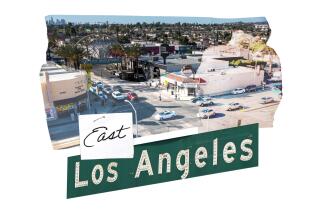It’s About Time L.A. Caught Up to Trend : Approval of combined purchasing for city is cumbersome
Last spring, when Los Angeles City Councilman Joel Wachs visited an office supply store to show how much the city can save on basic items, it was viewed as something of a publicity stunt. Well, the stunt worked, and the City Council just voted 12 to 0 to finally become a smart shopper. Mayor Richard Riordan is also behind the move.
The concept of combined purchasing power is not rocket science: Buy in bulk, and get a better price. It doesn’t get any easier than this.
Unfortunately, this is the sort of thing that shows what a behemoth this city bureaucracy is. Saving as much as $70 million annually out of a $750-million budget for supplies and equipment ought to be a fairly simple matter, right?
Wrong.
The council votes merely put the matter on the April ballot, giving voters a chance to clean house on what has been described as a series of costly and cumbersome charter restrictions on how the city makes such purchases. That would be Step No. 2 in this process. If the voters agree, Step No. 3 would involve a series of mayoral directives. Step No. 4 would be the submission of new ordinances. Step No. 5 would require council approval of these ordinances, and there would have to be enough controls to ensure that the whole thing passes the smell test for honesty and integrity.
We’re not calling for a thumbs up or a thumbs down on the current effort to save major dollars on purchasing. We are, however, pointing out that Los Angeles is well behind the times in these matters.
Los Angeles city officials, for example, are talking about pooling the purchasing power of various departments and agencies within the government. To say the least, that will not boldly go where no purchaser has gone before. We have examples.
For years, the Washington, D.C., government had been told by experts at the federal General Accounting Office and at the National Institute of Government Purchasing that it was paying top dollar for basic supplies and wasting precious tax dollars in the process. As is the case in Los Angeles, individual agencies there were also paying wildly varying prices for the same items.
Finally, in 1991, the D.C. government decided to maximize its considerable buying power by joining hands with purchasing cooperatives involving other jurisdictions.
By so doing, counties and cities and towns have routinely reaped big savings. Washington, D.C., for example joined the Metropolitan Washington Council of Governments, which represents the local lawmakers in a tri-jurisdictional region that includes Washington’s Maryland and northern Virginia suburbs.
And it can be done on an even larger scale than that. The nation’s southeastern states have been involved in a purchasing cooperative for years. A smaller buying group pools the resources of the states of Delaware, Maryland and Virginia. If this sort of thing is unheard of in these parts, we suggest that our locally elected officials start making a few telephone calls.
Council member Wachs has helped point out that the city has been routinely paying $300 for $125 answering machines, and $24.45 for computer diskettes that retail for less than $6.60. Times are simply too tight for such waste, and getting the most out of our tax dollar has never been more important.
More to Read
Sign up for Essential California
The most important California stories and recommendations in your inbox every morning.
You may occasionally receive promotional content from the Los Angeles Times.










